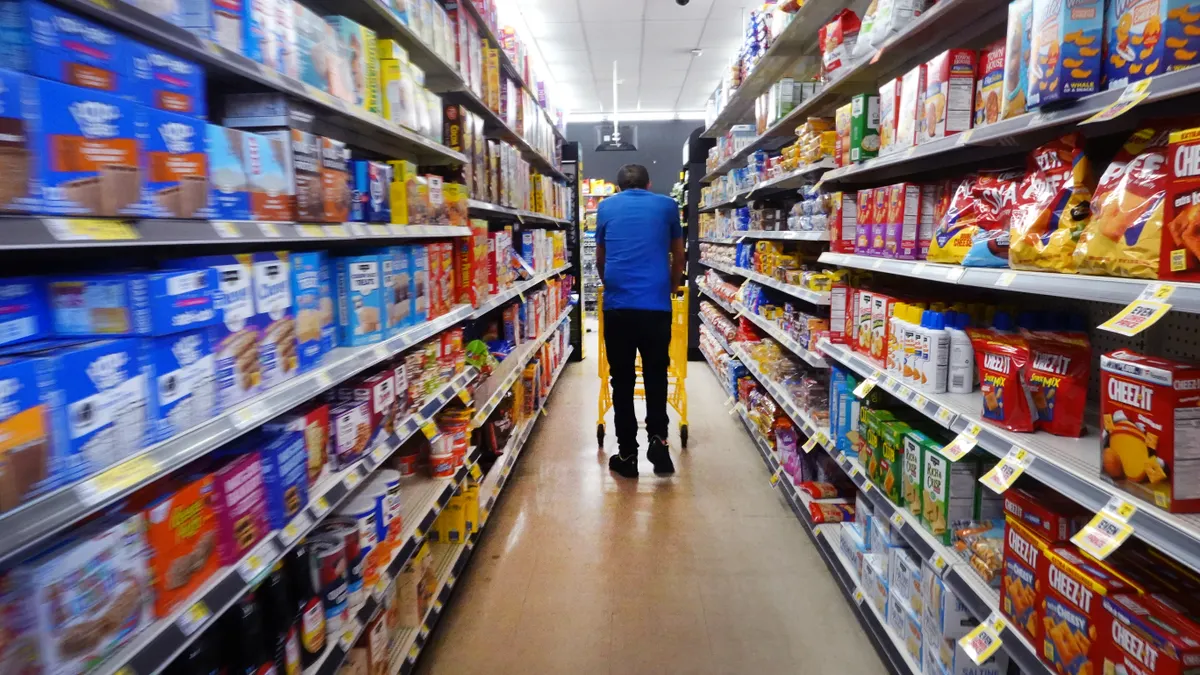Picture this: a drone gently lowers a grocery bag into your backyard as you sip coffee on the porch. Inside the store, choose your items and simply exit—no cashier, no stopping. Meanwhile, a smart cart follows your every move, tallying totals, showing deals, and handling checkout for you. Explore how drone delivery pilots, AI-powered shopping carts, and walk-out stores are shaping autonomous retail—from Walmart and Deliveroo to AI cart innovations
This isn’t a scene from a sci-fi novel—it’s the reality transforming retail in 2025. A new wave of innovation is converging: drone-based delivery, self-service walk-out stores, and AI-powered smart carts. Together, they mark a bold departure from old paradigms toward automation that blends efficiency with personalized consumer experiences.
This blog dives deep into:
- Drone delivery pilots (Walmart, Deliveroo) and the next frontier in logistics.
- Cashier-free stores and AI carts (Caper, Dash) that remove friction inside stores.
- Broader trends and market forecasts in autonomous retail.
- Consumer sentiment and how retail labor is evolving.
Welcome to the autonomous retail revolution—where skies, aisles, and carts are all humming with AI.
Drone Drops: Walmart’s Skyborne Revolution
Walmart’s Expansion
Since 2021, Walmart has collaborated with Wing, Zipline, and DroneUp to explore scalable drone delivery. As of mid-2025:
- Walmart has completed over 150,000 drone deliveries.
- Drones serve over 1.8 million households across Dallas-Fort Worth, Atlanta, Houston, Orlando, Tampa, and Charlotte.
- Delivery radius: 6 miles, with average delivery times between 15-20 minutes.
From sunscreen to scrambled eggs, the delivery list has become increasingly diverse. Some shoppers even ordered fragile goods like eggs to “test the system,” and found them intact upon delivery.
Infrastructure & Investment
Walmart is now prioritizing partnerships with Wing and Zipline to boost efficiency. Zipline’s autonomous droids deliver orders by descending gently on tethers, while Wing’s BVLOS-certified drones use cloud-based traffic control to scale safely.
Consumer Sentiment
- 90% of trial customers in Dallas-Fort Worth said they’d use drone delivery again.
- The novelty has given way to normalized convenience—faster than traditional same-day delivery, especially for forgotten household items.
Deliveroo Soars: Drone Meals in Dublin
Manna x Deliveroo Pilot
Deliveroo partnered with Manna, a drone logistics company, to launch Europe’s fastest food delivery trial in Blanchardstown, Dublin.
- Drones reach speeds of 80 km/h, delivering in just 3-5 minutes.
- Over 170,000 deliveries completed to date.
The pilot began with fast food and coffee and is expanding to retail and groceries. Customers have been enthusiastic, especially during peak weather or mealtimes.
Local Pushback
With innovation comes challenge:
- Noise complaints have emerged.
- Wildlife and privacy concerns are now prompting regulatory reviews.
- Deliveroo and Manna are working with city planners to optimize flight routes and mitigate disruption.
Despite these concerns, the momentum is clear: autonomous aerial delivery is no longer a concept. It’s a service in motion.
Inside the Store: AI Smart Carts & Walk-Out Formats
Smart Carts in Action
Caper AI carts, now operated by Instacart, are redefining in-store shopping. These carts:
- Auto-scan and recognize items as they are placed inside.
- Show live tallies, discounts, and personalized offers.
- Allow checkout via touchscreen—no lines, no human contact.
Deployment Highlights
- Coles Australia piloted Caper in Melbourne, the first APAC deployment.
- AWG in the U.S. introduced over 2,300 units across grocery locations.
- Bowman’s Market in Utah saw a +18% increase in basket size and higher coupon engagement.
Walk-Out Store Growth
Beyond carts, cashier-less stores using AI sensors, cameras, and RFID technology are scaling. From Amazon Fresh to Carrefour Flash, the experience is now seamless:
- Scan to enter.
- Take what you want.
- Walk out.
- Receipt delivered via app.
Juniper Research projects 12,000+ walk-out stores globally by end of 2025.
By the Numbers: Autonomous Retail at Scale
| Innovation | 2025 Stats & Projections |
|---|---|
| Walmart Drone Delivery | 1.8M households, 150K+ deliveries completed, 30-min service radius |
| Deliveroo Dublin | 170K+ drone flights, 3-5 min delivery window, expanding into retail |
| Smart Carts | $2.25B global market by 2025, $6.2B by 2030 (22% CAGR) |
| Walk-Out Stores | 12,000 stores globally by 2025; $10B+ projected revenue impact |
Opportunities & Ethical Considerations
Advantages
- Speed & Convenience: Deliveries in under 30 minutes, no checkout delays.
- Operational Efficiency: Lower labor costs, more accurate inventory.
- Personalization: Data-driven recommendations and budgeting tools for customers.
Challenges
- Privacy: AI surveillance and in-store tracking raise regulatory red flags.
- Accessibility: Elderly and tech-wary users need inclusive design.
- Labor Transition: Cashier roles are evolving into tech support, greeters, and fulfillment specialists.
Retailers must tread carefully, ensuring human dignity and transparency aren’t lost in automation.
What Comes Next: Trends to Watch
- Retail x Logistics Integration: Expect tighter links between in-store automation and drone/van delivery.
- Decentralized Fulfillment: Micro-warehouses and AI restocking systems inside or near stores.
- Ad-Powered Shopping: Smart carts will serve real-time ad spots based on movement, purchase history.
- Multimodal Last-Mile: Drones for quick drops; AVs and bots for larger orders.
- Consumer Data Hubs: Unified profiles enabling seamless omnichannel shopping.
Mattias Knutsson Reflects: Strategic Trust in Smart Systems
Mattias Knutsson, a seasoned leader in global procurement, sees the future of retail as more than a tech race:
“Autonomous retail isn’t just about faster checkouts or airborne efficiency. It’s about aligning smart technology with consumer trust. True innovation makes life easier while respecting privacy, equity, and human connection.”
His insight reminds us that behind every drone flight or AI cart is a human moment—a choice to shop smarter, yes, but also more consciously.
Conclusion:
From sky to shelf, autonomous retail is reshaping how the world shops. In 2025, convenience is expected, but connection remains vital.
If drone deliveries, AI carts, and frictionless stores can blend convenience with empathy, and speed with sustainability, we enter not just a smarter era of retail—but a better one.
As we look skyward and push forward, the question isn’t whether autonomous retail is coming. It’s whether we will build it with the care, creativity, and conscience it deserves.





